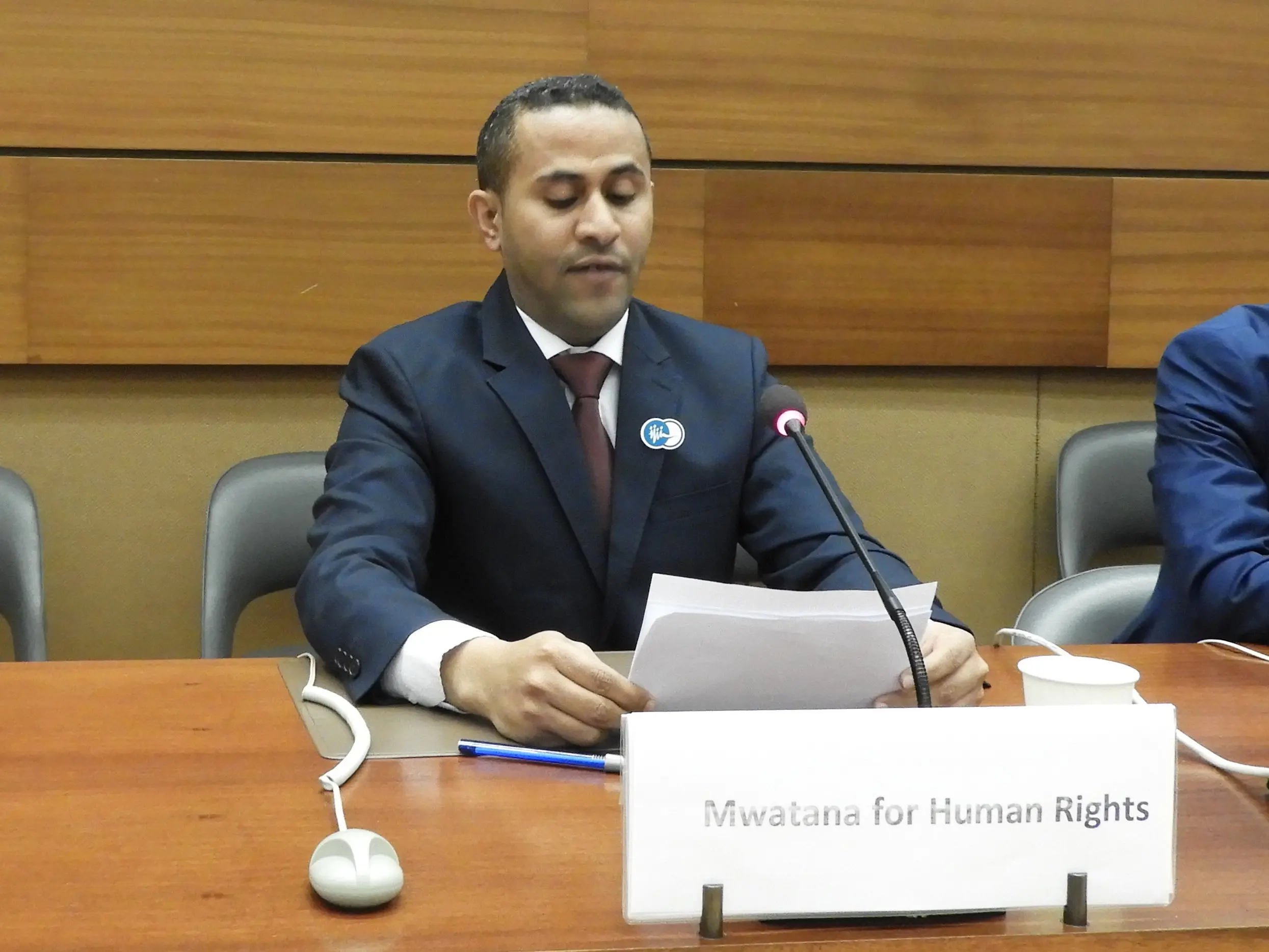
Engagement with Diplomatic Missions

Ayman Al-Kanani, Director of the Training and Development Unit at Mwatana for Human Rights, in collaboration with the Human Rights Clinic at Columbia University, participated in the preliminary session of the Universal Periodic Review (UPR) focused on Yemen at the headquarters of the Human Rights Council in Geneva, Switzerland. This initiative forms part of Mwatana's endeavors to illuminate the human rights violations perpetrated by conflicting parties in Yemen over the past nine years.
During his visit to Geneva, the Director of the Training and Development Unit at Mwatana convened meetings with several representatives from diplomatic missions at the Human Rights Council, including those from Liechtenstein, Norway, Mexico, Costa Rica, Estonia, Belgium, Sweden, Netherlands, and European Union Mission. Furthermore, consultations were held with the Office of the High Commissioner for Human Rights, the Cairo Center for Human Rights Studies, and the International Federation for Human Rights. These discussions centered on the prevailing situation in Yemen and the persistent violations committed by the conflicting parties.
Ayman Al-Kanani, Director of the Training and Development Unit at Mwatana, also delivered a briefing before the United Nations Human Rights Council during the preliminary session of the 46th Universal Periodic Review. His address focused on the general state of affairs and the prevalent patterns of human rights violations in Yemen. He concluded by presenting a series of demands and recommendations.
The Briefing Transcript
Hello Everyone,
Today, I speak on behalf of the Mwatana for Human Rights.
Mwatana diligently monitors and investigates human rights violations committed by all parties to the conflict in Yemen. Our researchers conduct field visits to sites of these violations, interview victims, and gather relevant evidence.
Mwatana has documented violations committed by the internationally recognized government forces, their affiliated parties, UAE-backed forces, as well as violations by the Ansar Allah (Houthi) group.
Today, I will highlight violations related to attacks on civilians, as well as violations against migrants, the use of landmines, and women's rights abuses.
During the UPR reporting period, Yemeni conflict parties have indiscriminately attacked densely populated residential areas, exacerbating civilian suffering and triggering new waves of displacement. Since the last UPR, Mwatana has documented 430 ground attacks, resulting in at least 268 casualties, including women and children.
Additionally, civilians have been targeted with live ammunition. As illustrated on this slide, Mwatana has documented hundreds of incidents where civilians were killed or injured due to the use of live ammunition by Yemeni and Emirati-backed forces. Furthermore, civilians have been victims of military vehicle ramming incidents. These incidents constitute clear violations of international humanitarian law.
Now, I will address violations against migrants in Yemen. In the previous UPR, Yemen supported recommendations aimed at improving protection for vulnerable groups, including migrants. However, during the period under review, we have observed an increase in violations committed by the Yemeni government against migrants.
Mwatana documented 76 cases of human trafficking and smuggling by Yemeni conflict parties and migrant smuggling rings in areas under their control. After enduring perilous journeys, leaving their homes in search of safety and a better life, migrants often face various forms of exploitation, torture, and sexual assault. Some migrants have reported being detained at gunpoint and robbed by soldiers affiliated with conflict parties.
Despite a decline in military operations, clashes persist. As displaced civilians return home, the number of casualties - especially among children - due to landmines and other war remnants continues to rise.
Under the Mine Ban Convention ratified by Yemen, the possession and use of anti-personnel mines are prohibited because these devices do not distinguish between civilians and combatants, according to international humanitarian law, and their impact remains destructive even after the conflict ends. For example, a landmine exploded under a vehicle carrying people returning from a wedding, injuring 32 civilians, including 24 children. In another incident, a child who lost both of his legs after stepping on a landmine outside his village told us how much he missed playing with his friends.
Lastly, I will address violations against women. The Ansar Allah (Houthi) group started imposing restrictions on women's movement and freedom. Specifically, they require all women to travel with a male guardian (Mahram) or permission from a male guardian. Mwatana has documented cases of women being harassed by checkpoint personnel while traveling without a male guardian. Additionally, the Ansar Allah (Houthi) group has restricted women's right to work by issuing new regulations limiting women's employment opportunities.
The internationally recognized government has begun adopting some of the same practices as the Houthis. They have started restricting women's freedom of movement and assembly. Authorities in Marib have begun detaining women's rights defenders.
For the Yemeni people, lasting peace requires addressing the harms caused by years of conflict and rights abuses. It is time to break repeated cycles of violence.
We call for renewed peace efforts, but peace cannot be achieved without accountability. We urge investigations focusing on criminal issues to provide redress for victims.
We have a comprehensive list of recommendations and questions directed to the government in our UPR report, which we can share with you.
Mwatana calls on the international community to prioritize the Yemeni people and their human rights by offering strong and protective recommendations during the upcoming Universal Periodic Review process.
Thank you for your attention.